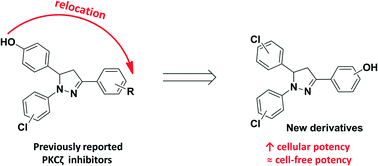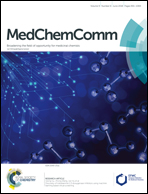Design and synthesis of novel 1,3,5-triphenyl pyrazolines as potential anti-inflammatory agents through allosteric inhibition of protein kinase Czeta (PKCζ)†
Abstract
Much light has been shed on the vital role of protein kinase Czeta (PKCζ) in NF-κB activation and the potential use of PKCζ inhibitors as anti-inflammatory agents. We previously reported a series of 1,3,5-trisubstituted pyrazolines as potent and selective allosteric inhibitors of PKCζ; in that series of compounds, the phenolic OH at the 5-phenyl was essential for binding to the PKCζ PIF pocket. In the present study, we surprisingly found that replacing it by a halogen and at the same time moving the OH to the 3-phenyl still resulted in active compounds. An extension of this class of compounds with a new focused library is presented herein, where the phenolic OH at the 5-phenyl, which was reported to be an irreplaceable feature for activity, was moved to the 3-phenyl and replaced by halogen. The new set of compounds maintained the same level of potency against PKCζ and selectivity against PKC isoforms, and showed reduced potency against the PIF pocket mutant PKCζ[Val297Leu]. Of note, the repositioning of the key functional groups resulted in a marked enhancement of cellular potency. One of the most potent new PKCζ inhibitors, 2h, was able to suppress NO production in RAW 264.7 macrophage cells with 8 times higher efficacy than the previous series, and inhibited the NF-κB transcriptional activity in U937 cells with a sub-micromolar IC50.



 Please wait while we load your content...
Please wait while we load your content...